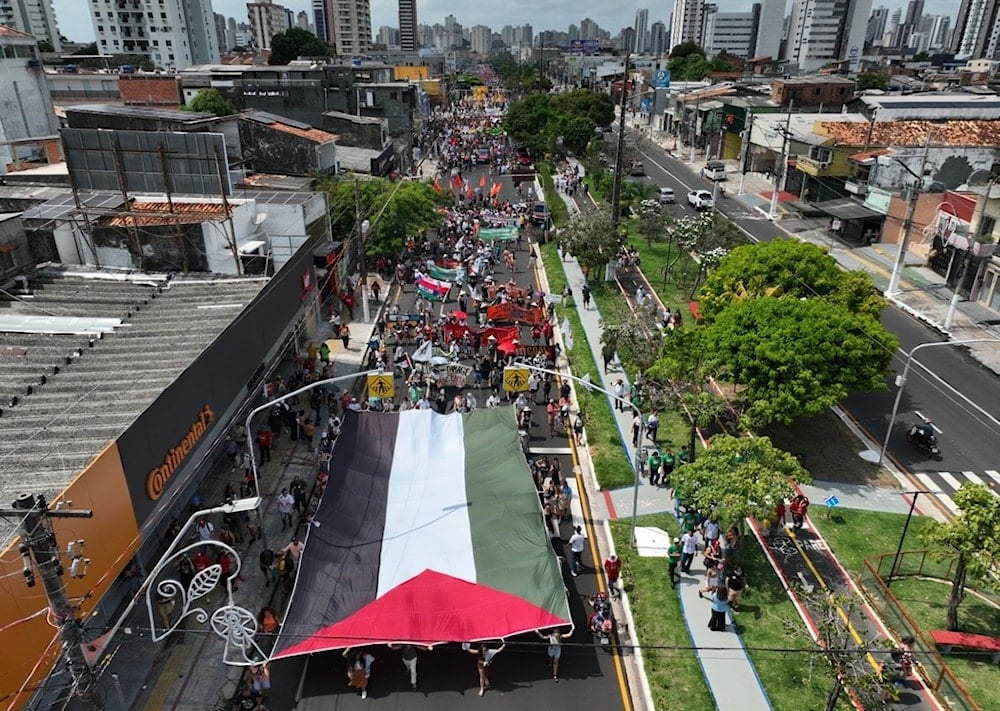Book unveiled at COP30 documents 130+ cases of ecocide by 'Israel'
A new book unveiled at COP30 exposes over 130 cases of environmental destruction caused by the Israeli occupation across Palestine and the region.
-

Activists participate in a climate protest, some holding a Palestinian flag, during the COP30 U.N. Climate Summit, Saturday, November 15, 2025, in Belem, Brazil (AP)
A new publication documenting widespread environmental devastation caused by the Israeli occupation in Palestine and surrounding regions was officially unveiled on Friday at the COP30 Summit in Belem, Brazil, Press TV reported.
Titled Global Periodic Reports on Environmental Destruction by the Israeli Regime, the volume was presented on the sidelines of the Asian Mayors Forum pavilion. It details the far-reaching ecological consequences of Israeli policies and military operations in the occupied Palestinian territories, with broader regional implications.
The book, prepared for submission to the United Nations Office of the High Commissioner for Human Rights, compiles over 130 documented cases of environmental destruction committed by "Israel". The findings highlight violations of international environmental law and underscore the growing threat to ecosystems, natural resources, and public health under occupation and siege.
The report covers destruction of agricultural land, contamination of water sources, deforestation, and the targeting of environmental infrastructure across Gaza and the West Bank.
Read more: IOF demolish Palestinian seed bank facility in al-Khalil
Experts, activists call for accountability
The unveiling event brought together international voices, including US human rights activist and former Green Party vice-presidential nominee Ajamu Baraka; political analyst Christopher Helali; Russia-based researcher Tim Anderson, Director of the Centre for Counter-Hegemonic Studies; Venezuela’s Minister of the Environment Pedro Ricardo Molina; and UK-based political analyst Bushra Sheikh.
Speakers described the publication as a critical step in documenting and exposing the environmental toll of the Israeli occupation. They emphasized that ecological destruction must be viewed not just as collateral damage, but as part of a broader system of control and dispossession.
Read more: Israeli strikes escalate in South Lebanon despite ceasefire
Environmental crisis worsens under occupation
Even prior to "Israel's" war on Gaza launched in October 2023, the occupied Palestinian territories faced severe environmental degradation due to decades of occupation, urban overpopulation, climate pressure, and systematic neglect.
According to a 2020 report by the United Nations Environment Programme (UNEP), long-standing occupation practices have severely compromised environmental management across Palestine. The situation has since worsened dramatically.
The latest war has devastated Gaza’s already fragile infrastructure, halting “almost all” forms of environmental governance, waste management, and water and sanitation. Israeli bombardment has also generated unprecedented levels of chemical contamination and rubble.
Read more: US watchdog flags Israeli human rights violations in Gaza: WP
UN: Gaza faces unprecedented environmental collapse
Back in June, UNEP warned that "Israel’s" large-scale destruction has left behind an estimated 40 million tons of debris in Gaza. The agency estimates that it would take 15 years to clear this volume of rubble, but only under ideal conditions: a lifted blockade and continuous deployment of at least 105 trucks per day.
Environmental experts have called this scenario increasingly unlikely given the ongoing siege and targeting of critical civil infrastructure.
The documentation presented at COP30 calls on the international community to recognize environmental destruction in Palestine as part of a larger pattern of systemic violations, and to act accordingly in support of accountability and ecological justice.

 3 Min Read
3 Min Read










